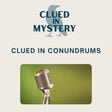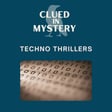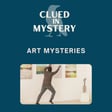Become a Creator today!Start creating today - Share your story with the world!
Start for free
00:00:00
00:00:01

Wilkie Collins
Wilkie Collins is credited with writing the first English detective novel. In this episode, Brook and Sarah discuss his remarkable life and his works.
Works discussed
References
http://mikegrost.com/sensatio.htm
https://www.sldirectory.com/libsf/booksf/mystery/early.html
https://victorianweb.org/authors/collins/bio.html
https://wilkiecollinssociety.org/publications/
For more information
Instagram: @cluedinmystery
Contact us: hello@cluedinmystery.com
Music: Signs To Nowhere by Shane Ivers - //www.silvermansound.com
Transcript
Introduction and Significance of Wilkie Collins
00:00:10
Speaker
Welcome to the Clued in Mystery podcast. I'm Sarah. And I'm Brooke, and we both love mystery. Brooke, I'm super excited to be talking about Wilkie Collins today. I loved learning about this guy. This was somebody who has always been on the radar, but I didn't know a lot about, and I was very surprised and am really looking forward to hearing what you have to say today, Sarah.
00:00:37
Speaker
Yeah, I am looking forward to comparing notes with you because, uh, yeah, I didn't know very much about him before we started, um, or before I started researching for, for this episode and, uh, just a really fascinating person. Definitely.
Collins' Unorthodox Lifestyle
00:00:55
Speaker
So I'll start with a quick bio and, and, um, then we can chat about his, his writing and his life.
00:01:05
Speaker
William Wilkie Collins was born in 1824 and died in 1889. During those 65 years, he had quite a life. His father was William Collins, who was an accomplished landscape artist and a member of the Royal Academy. His father was also conservative and religious and that influence, or perhaps a rejection of it, can be credited with what would be considered an unorthodox lifestyle in Victorian London.
00:01:33
Speaker
Rather than marrying, Wilkie lived with two women, dividing his time between them. He began his relationship with Carolyn Graves in 1858, and it continued until he died. He met Martha Redd around 1864, and in 1868, she moved within walking distance of the house that he shared with Carolyn Graves.
00:01:52
Speaker
Martha and Wilkie had three children and they used Dawson as their surname because the couple went by William and Martha Dawson, likely to lend their relationship some respectability. Carolyn Graves actually married another man in 1868 but that relationship only lasted a couple of years before she returned to Wilkie and both women outlived him.
00:02:12
Speaker
Wilkie's health was not great and he was a heavy user of opium or laudanum due to pain that he suffered from gout. He travelled extensively seeking cures for his ailments. He was also very well educated and while he was at boarding school it was another student bullying him into telling him stories nightly that ignited his passion for writing.
00:02:31
Speaker
He ultimately studied law at Lincoln's Inn and was called to the bar in 1851, but never actually practiced law.
Literary Achievements and Collaboration with Dickens
00:02:38
Speaker
By then, he'd already published several stories and a novel, and around that time he began working with Charles Dickens, with whom he formed a very close relationship. And they worked together on plays and other creative works. He continued writing. Four of his novels, including The Woman in White and The Moonstone, were published in the 1860s, and it was those that brought him the most fame.
00:02:58
Speaker
The Woman in White was so popular that merchandise, including clothing, perfume, and music were named after it. As with many of the authors that we've looked at, he was very prolific, publishing at least 25 novels, more than 50 short stories, and at least 15 plays, and more than 100 nonfiction pieces. Though I actually found higher numbers for the novels and short stories in a couple of sources, so I'm not sure what the actual total was.
00:03:27
Speaker
The Moonstone, which was published in 1868, is considered to be the first modern English detective novel. And The Woman in White is regarded as a sensation novel, which I think is a precursor to psychological or domestic thrillers because the plots involved conspiracies and secrets. By 1870, he was, according to one source that I found, the most famous writer of English fiction.
00:03:53
Speaker
Interestingly, the first novel that he wrote was only published in 1999, so 110 years after he died. Researchers believed that the novel, which was called Ailani or Tahiti as it was, a romance, existed based on references in Wilkie's letters.
00:04:10
Speaker
But no evidence was found of it when he died.
Discovery of Posthumous Novel
00:04:14
Speaker
Although, subsequently, researchers traced it from a playwright who had worked with Collins to dramatize his stories and novels. After the playwright's death in 1899, the manuscript was auctioned in 1900 and 1903, and then held in a private collection until 1991, when it was made available for auction again and published in 1999.
00:04:34
Speaker
The full text is available online and we will put a link to that in the show notes. So yeah, that's just a brief summary of his life, but I think there's lots that we can unpack there and lots that I want to discuss about him.
00:04:49
Speaker
Oh my gosh, yes. So that was excellent. Excellent little bio, Sarah. I learned a few things that even I didn't discover in my research. I thought that it was really interesting. There's a few points that I discovered in learning about him that things that we think of as modern, either modern issues or modern topics came up in his life. And I learned another one. He had merch.
00:05:14
Speaker
We think of that as kind of this modern day thing for authors, but he had merch and I did not know that. That's exciting and very cool. And then the other point of having that novel come out 110 years after his death, that's just fascinating.
Collins' Declining Fame
00:05:31
Speaker
Yeah, I mean, the merchandise thing is, I thought that was really interesting. I didn't see if he licensed it or if he benefited from its sale. But the fact that people, he was so popular at the time. I read about the close relationship that he had with Charles Dickens. I think I got the sense that he was
00:05:54
Speaker
at the time, more popular than Dickens was. But for whatever reason, I think Dickens, his popularity has endured. Whereas I don't know that Wilkie Collins is, he's certainly not a household name now. And I imagine it's really people who are kind of scholars in the mystery genre who
00:06:18
Speaker
who were really familiar with him. Because I wasn't actually familiar with him before we started looking into him. Yeah, exactly. You're right. Charles Dickens is the enduring name that we recognize. But they were definitely colleagues at the time, did a lot of work together, and then also were just friends, spent a lot of time together. And I thought I was shocked because
00:06:46
Speaker
In a sense, Wilkie Collins was so famous at this point in time. He was like the rock star of the 1860s literary scene. He had the women and the drugs and ran around with famous people and very rebellious as far as his family felt, was living this very unorthodox, like you say, lifestyle. He was like a rock star.
00:07:16
Speaker
Totally. Yeah. Like you say, he and Dickens were colleagues, and the women in white and the moonstone were both serialized in Dickens' magazine. So Dickens founded this magazine all the year round, initially to promote his own work.
00:07:39
Speaker
I think A Tale of Two Cities and a couple of his other works he serialized in that magazine, but then also works of other authors and including Wilkie Collins. And then I think they, you know,
00:07:55
Speaker
on stories, the Christmas editions of this magazine. But there's a lot of reference to how close that relationship was.
00:08:11
Speaker
Definitely. And that brings up one of those points that I was thinking of that we think of as a modern situation that clearly is not at all because both Dickens and Wilkie Collins, they kind of utilized their creative work in as many different formats as they could. They serialized their stories that which came out in Dickens publications.
00:08:31
Speaker
then they would create book editions of them when the story was complete. And then many times they would have a stage adaptation. So they were similarly to what authors do these days where we want the ebook format, the print format and audiobook and then fingers crossed, you know, some film network comes along and you could sell some film rights. I mean, this was happening clear back in the 1850s and 60s. So certainly nothing that we've come up with in modern times.
00:08:59
Speaker
Yeah, I thought that was really interesting as well. And then I also thought it was interesting that Dickens started this magazine to publish himself. Right. So, you know, the idea of authors, indie publishing isn't new either.
Secrecy and Personal Life of Collins
00:09:15
Speaker
Definitely.
00:09:15
Speaker
Another point of the not modern issue is the issue that he had with privacy because he was such a famous person and people were interested in his life that he tried his best to keep his private life private, which was probably important to him considering the very strange living arrangement that he had. And I was wondering, Sarah, in your research, if
00:09:38
Speaker
Did the two women know about each other? I mean, they lived literally on the same block. So I'm assuming that they were aware of one another, but did you learn about that at all? Yeah, I didn't. So I had the same question, you know, how, how integrated were, were those two lives that he, uh, or those two relationships that he had. And I didn't find the answer to that.
00:10:00
Speaker
So, as you say, they must have known about each other. And actually, no, I did see a reference to when Caroline got married that it may have been in reaction to his relationship with Martha Rudd.
00:10:15
Speaker
Um, but clearly she, you know, felt very strongly for Wilkie and ended up returning to him. So, you know, they must have figured out a way to make it work. Yeah. I thought it was really interesting that he used a different name, uh, when he was with Martha and he did when he was with Caroline. So, you know, really sort of compartmentalizing those lives.
00:10:38
Speaker
That is interesting. Yeah. I also learned that he always kept his money in his mother's bank account. I mean, certainly at some point in time she passed away and that must have changed, but at least for a long time. And I was wondering to myself, is, was that because, was it because of convenience? Was it because then that way he would just draw out the money it said that he needed?
00:11:02
Speaker
for his household bills or was it so that he didn't have to worry about that conflict of how much money do I give to this woman? How much money do I, you know, my imagination was going strong when I heard that. So just another interesting layer to that, to that story and how he kept two households running. Yeah, that's really interesting. I hadn't seen that.
00:11:22
Speaker
Yeah, just a little bit more about his lifestyle. I read that he really enjoyed eating, he really enjoyed drinking. So I imagine he was quite, as you say, quite a rock star and quite the life of the party and must have been a very interesting person to spend time with.
00:11:44
Speaker
Yes, I read that he was a really warm personality, really well liked by his friends, you know, somebody that you wanted to spend time with. And so definitely he seems like he would be just a good friend, a fun person to be with.
00:11:59
Speaker
makes me wonder just thinking about his fame. He was so famous for a time. Why is it that that's no longer the case for him, right? That he's sort of lost that popularity. There are adaptations of the Women in White and Moonstone. So there was one of each of those I think in the early 2000s and then more recently
00:12:24
Speaker
BBC did, um, uh, adapted both of them again. So certainly enduring stories and you know, the, they really set precedent, I think for, um, the kinds of entertainment that, that we enjoy now in terms of the mystery books that we read, whether it's a psychological thriller or detective mystery. Right.
00:12:49
Speaker
Yeah, and I loved that they called it at the time the sensation novels. And I thought, you know, that's something we might call these days, like the page turner. I imagine that I read The Moonstone and I know, Sarah, you read Woman in White and both of them did have that feel where at the end of a chapter, I wouldn't necessarily call it a cliffhanger the way we discuss that, but it was that feeling of
00:13:15
Speaker
Oh my gosh, what's going to happen next? I definitely had that feeling.
Innovative Narrative Techniques
00:13:20
Speaker
Even though I will say that the prose was very dense compared to what we're used to these days, it did remind me of Dickens. The style as far as sometimes you go off on a tangent, sometimes you get into pages and pages of description.
00:13:39
Speaker
What was your opinion, Sarah? Did you get the feeling that that was a style of the time? Or do you think that he sort of had that similar style because they were friends and working together?
00:13:55
Speaker
Yeah, I think that's a really good question. And it's probably a little bit of both, right? I imagine that both Dickens and Collins kind of drew inspiration from each other in terms of their writing styles. But yeah, you definitely can place his writing in a particular period of time in terms of what other works were
00:14:25
Speaker
were coming out. And I thought a little bit about this in relation to the serialization, right? They, I think it was, I can't remember if it was 16 or 20 parts that the women in white was serialized over. So that's, I mean, it's a long, it's a fairly long book. You know, you kind of want to build your audience's interest because I think it was published weekly.
00:14:48
Speaker
And so I can see why it was written that way. I would be curious to know where those breaks were in terms of how much was published in each issue of the magazine.
00:15:04
Speaker
But yeah, I'm with you. The prose is pretty dense. It's not at all like what we currently have. Lots of description and a fair amount
00:15:18
Speaker
of interjection, one of the things that I thought was really interesting about the woman in white is that it's actually told from multiple points of view. So at the beginning, it's explained that there are many people who observed the story. So it's told at the beginning from the perspective of this art teacher who's sent to tutor some students. And then the point of view changes as different people come into the story.
00:15:42
Speaker
I couldn't think of any other examples of early writing that used multiple points of view. I didn't read anything of the Moonstone. Did it use multiple points of view? It does. Yeah. It's the same idea. It's a little more compact in that it, I can't recall exactly how many, but maybe three or four. So it rotates through the different points of view.
00:16:06
Speaker
And I was a little disappointed because when I read the description of it, it said it was an epistolary novel. And you know, Sarah, that I'm a fan. And you write an epistolary series. So I was very excited about that. But I think that that was sort of an inappropriate sell. And I would not call it that. I would just say it's simply multiple points of view.
00:16:32
Speaker
But I would agree with you. We haven't seen that before in these earlier works that we've discussed. So perhaps that's another one of his pioneering story devices. I mean, if he wasn't the first, he would he would have been amongst the first to use multiple narrators. Right.
Impact of Drug Use on Later Works
00:16:49
Speaker
I want to watch actually one of the adaptations. I didn't have a chance to do that, but it would be interesting to see kind of how. Visually, some of these stories are told
00:17:01
Speaker
I would definitely like to. I, as, as you said, I didn't have time to, but that's now that's kind of on my list of films to look for. I would really enjoy that. And you know, you said earlier about why did he not stay as a popular literary figure and Charles Dickens did. And one thing that I read was that honestly, he didn't really go out on a high note. His work sort of became, fell out of favor. It maybe wasn't as good in his later years and
00:17:30
Speaker
that's partially credited to his increasing use of opium. So he wasn't, he didn't go out on a high note, but they also, this podcast I listened to also referenced the fact that his later works had more and more and more dialogue scenes, pages and pages, and also kind of like just sitting indoors in a room having conversations.
00:17:54
Speaker
And they believed that that was partially because it made it easier for him to adapt those works into stage presentation super kind of like writing a script. But it made the novels less satisfying because your characters are in one place sitting in a room talking.
00:18:11
Speaker
So, I wonder if that contributed to the fact that his public kind of lost interest in him and then he sort of fell out of favor and we just didn't remember him the way that we did some of his colleagues. Yeah, I did read that as his health declined, kind of so did his writing.
00:18:31
Speaker
I looked into to see if there was anything about how he wrote. And there actually was an essay that he wrote and it was written as if it was a letter and he was published towards the end of his life. He talks about how he starts first focusing on the story and then on the characters. And then he drafts without focusing on the details. But there are several stages of revision where those details are added in.
00:18:58
Speaker
And I thought that I thought it was really interesting because the process to me didn't sound vastly different from how I think a lot of people write, right? You're kind of inspired by the idea and you build the story around that.
00:19:13
Speaker
Yeah, it seems like really accessible. I mean, that's a very inspiring I think for younger authors to like you have this person who was very successful and revered and wrote some famous stories and it's like you really just have to go back to the basics. You get your story and you put in the characters and then you start layering in the details. I love it. I thought a lot about how the pressure
00:19:41
Speaker
or the timeline of having the serialized story must have impacted. So I looked that up too and saw very similar information to what you did and that he was always plotting ahead because he had these weekly deadlines to meet.
00:19:58
Speaker
The pressure would be real. That seems like it would be a big feat. Totally. Yeah, it would be intense.
The Pressure of Serialized Writing Format
00:20:06
Speaker
I think particularly if you know, I mean, I don't know how far ahead he was submitting his work. I personally would probably have the thing written before it was serialized because I would want to know that I had a conclusion, right, that kind of made sense. But it sounds like maybe he didn't plan it out quite as much.
00:20:28
Speaker
Yeah, it really seemed like they were writing and releasing. And so I had the exact same thoughts are like, Oh my gosh, you're, you're writing into the dark quite literally because would have this pressure. It's like those television series that we see. And sometimes you're like, are they making this up week by week? Well, they quite certainly might be because this is just how the pressure of something like that would be. So I don't think he had it done ahead of time, at least.
00:20:56
Speaker
for, you know, some of the work. I think he was writing it as he went and that that is very impressive to me. And I think that for a lot of people who write novel length works, they would never be able to produce a story like that. So we really have to give him his props for being able to pull that off. And Dickens and the other people who were doing Doyle certainly was working on that with the Sherlock Holmes. So it's very impressive.
00:21:21
Speaker
Yeah, as I was learning more about him, I was thinking it would force you, I think, to write well, right? I mean, there would be a lot of pressure. You kind of have to, you must be thinking about writing all the time, like thinking about the plot, even if you're not physically putting words out onto the page. Must have spent a lot of time just thinking about his stories so that when it came time to getting them out, it, you know,
00:21:46
Speaker
it went smoothly. Although he does in that essay, he does talk about not being happy with what he's produced and then having to kind of start over. So I don't remember now if the essay must have been talking more about works that he hadn't serialized because you just I don't think would have that time to kind of let something sit and reflect on it, right? Definitely. And he was
00:22:10
Speaker
doing all this while juggling two households. Let's not, let's not forget that very key point. Yeah, totally. And, and his fame, attending dinners and, and, um, you know, I think he went on literary tours. I think he went to North America at least once on a tour to talk about his writing, which there were probably not a lot of authors who did that.
00:22:34
Speaker
Right. So, yeah, so this was a really interesting person to learn more about
Conclusion: Collins' Legacy in Mystery Genre
00:22:40
Speaker
Brooke. And, you know, I'm definitely going to check out at least one of the screen adaptations of his works. And I'd love to compare notes after we've done that.
00:22:51
Speaker
Yeah, that sounds great. I'm so glad that we decided to research Wilkie Collins and to kind of round out these pioneers of the mystery genre because he definitely was a huge contributor. Absolutely. And I think it provides some really good context to kind of understand how the genre
00:23:10
Speaker
emerged and, and, and evolved. Um, and yeah, I feel like we've got a, we've kind of done a good, I don't know, mystery 101 survey of, of the, um, of the pioneers to the, to the space. Exactly. Thanks for listening to the Clued in Mystery podcast. We'd love to hear what you think. You can reach us on Instagram at Clued in Mystery. Send us an email at hello at cluedinmystery.com and find out more at cluedinmystery.com.
00:23:38
Speaker
Please consider leaving a review or telling a friend. Thanks for joining us today on Clued In Mystery. I'm Brooke. And I'm Sarah. And we both love mystery. Clued In Mystery is produced by Brooke Peterson and Sarah M. Stephen. Music is by Shane Ivers at Silvermansound.com. Visit us online at CluedInMystery.com or social media at Clued In Mystery. If you liked what you heard, please consider subscribing, leaving a review or telling your friends.
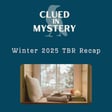
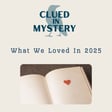
![[Re-release] Anthony Berkeley image](https://media.zencastr.com/cdn-cgi/image/width=112,quality=85/image-files/61e1c276e3ec42007857cff9/e7c778ac-a2ba-4809-9a5c-7cd39d167834.jpg)
![[Bonus] Wake Up Dead Man image](https://media.zencastr.com/cdn-cgi/image/width=112,quality=85/image-files/61e1c276e3ec42007857cff9/e276ac32-e664-464f-956c-7699bdb60aa5.jpg)


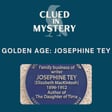
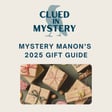
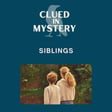

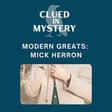

![[Bonus] Read Along: Daughter of Time image](https://media.zencastr.com/cdn-cgi/image/width=112,quality=85/image-files/61e1c276e3ec42007857cff9/b953ad72-c43e-48ca-a18a-b3c216ab90ee.jpg)

